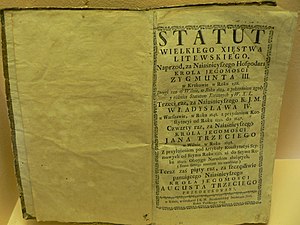Statute

Statute of Grand Duchy of Lithuania, written in Polish
A statute is a formal written enactment of a legislative authority that governs a city, state, or country.[1] Typically, statutes command or prohibit something, or declare policy.[1] Statutes are rules made by legislative bodies; they are distinguished from case law or precedent, which is decided by courts, and regulations issued by government agencies.[1]
Contents
1 Publication and organization
2 Alternative meanings
2.1 International law
2.2 Autonomy statute
3 Religious statutes
3.1 Biblical terminology
3.2 Dharma
4 See also
5 References
6 External links
Publication and organization
In virtually all countries, newly enacted statutes are published in a Government gazette which is then distributed so that everyone can look up the statutory law.
A universal problem encountered by lawmakers throughout human history is how to organize published statutes. Such publications have a habit of starting small but growing rapidly over time, as new statutes are enacted in response to the exigencies of the moment. Eventually, persons trying to find the law are forced to sort through an enormous number of statutes enacted at various points in time to determine which portions are still in effect.
The solution adopted in many countries is to organize existing statutory law in topical arrangements (or "codified") within publications called codes, then ensure that new statutes are consistently drafted so that they add, amend, repeal or move various code sections. In turn, in theory, the code will thenceforth reflect the current cumulative state of the statutory law in that jurisdiction. In many nations statutory law is distinguished from and subordinate to constitutional law.
Alternative meanings
International law
The term statute is also used to refer to an International treaty that establishes an institution, such as the Statute of the European Central Bank, a protocol to the international courts as well, such as the Statute of the International Court of Justice and the Rome Statute of the International Criminal Court. Statute is also another word for law. The term was adapted from England in about the 18th century.
Autonomy statute
In the Autonomous Communities of Spain, the autonomy statute is a legal document similar to a state constitution in a federated state. The autonomies statutes in Spain have the rank of "Ley Organica", a category of special laws reserved only for the main institutions and issues and mentioned in the Constitution (the highest ranking legal instrument in Spain). Leyes Organicas rank between the Constitution and ordinary laws. The name was chosen, among others, to avoid confusion with the term Constitution (i.e. the Spanish Constitution of 1978).
Religious statutes
Biblical terminology
In biblical terminology, statute (Hebrew chok) refers to a law given without any reason or justification. The classic example is the statute regarding the Red Heifer.(Numbers 19:2)
The opposite of a chok is a mishpat, a law given for a specified reason, e.g. the Sabbath laws, which were given because "God created the world in six days, but on the seventh day He rested" (Genesis 2:2-3).[citation needed]
Dharma
That which upholds, supports or maintains the regulatory order of the universe meaning the Law or Natural Law. This is a concept of central importance in Indian philosophy and religion.
See also
- Constitution
- Legislation
- Legislature
- Organic statute
- Statutory law
- Super statute
References
^ abc Black, Henry Campbell (1990). Black's Law Dictionary, Sixth Edition. West Publishing. p. 1410. ISBN 0-314-76271-X..mw-parser-output cite.citationfont-style:inherit.mw-parser-output qquotes:"""""""'""'".mw-parser-output code.cs1-codecolor:inherit;background:inherit;border:inherit;padding:inherit.mw-parser-output .cs1-lock-free abackground:url("//upload.wikimedia.org/wikipedia/commons/thumb/6/65/Lock-green.svg/9px-Lock-green.svg.png")no-repeat;background-position:right .1em center.mw-parser-output .cs1-lock-limited a,.mw-parser-output .cs1-lock-registration abackground:url("//upload.wikimedia.org/wikipedia/commons/thumb/d/d6/Lock-gray-alt-2.svg/9px-Lock-gray-alt-2.svg.png")no-repeat;background-position:right .1em center.mw-parser-output .cs1-lock-subscription abackground:url("//upload.wikimedia.org/wikipedia/commons/thumb/a/aa/Lock-red-alt-2.svg/9px-Lock-red-alt-2.svg.png")no-repeat;background-position:right .1em center.mw-parser-output .cs1-subscription,.mw-parser-output .cs1-registrationcolor:#555.mw-parser-output .cs1-subscription span,.mw-parser-output .cs1-registration spanborder-bottom:1px dotted;cursor:help.mw-parser-output .cs1-hidden-errordisplay:none;font-size:100%.mw-parser-output .cs1-visible-errorfont-size:100%.mw-parser-output .cs1-subscription,.mw-parser-output .cs1-registration,.mw-parser-output .cs1-formatfont-size:95%.mw-parser-output .cs1-kern-left,.mw-parser-output .cs1-kern-wl-leftpadding-left:0.2em.mw-parser-output .cs1-kern-right,.mw-parser-output .cs1-kern-wl-rightpadding-right:0.2em
External links
| Look up statute in Wiktionary, the free dictionary. |
| Wikiquote has quotations related to: Statutes |
| Wikimedia Commons has media related to Statutes. |
Library resources about Statute |
|